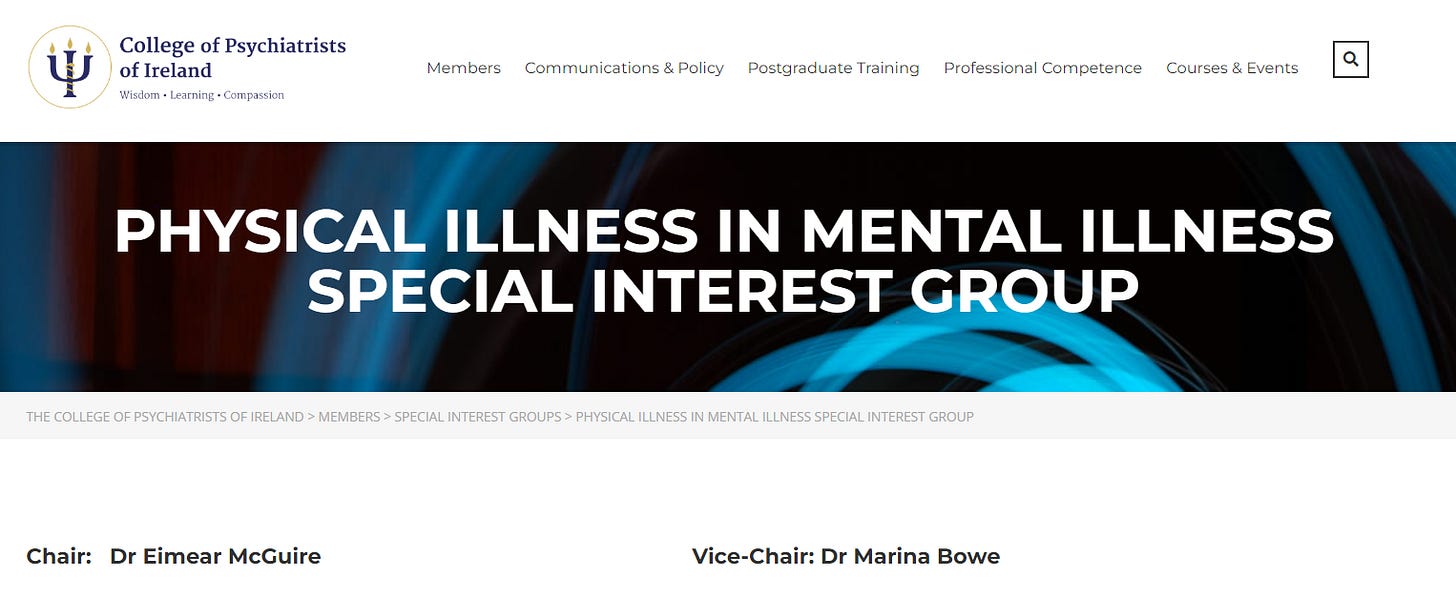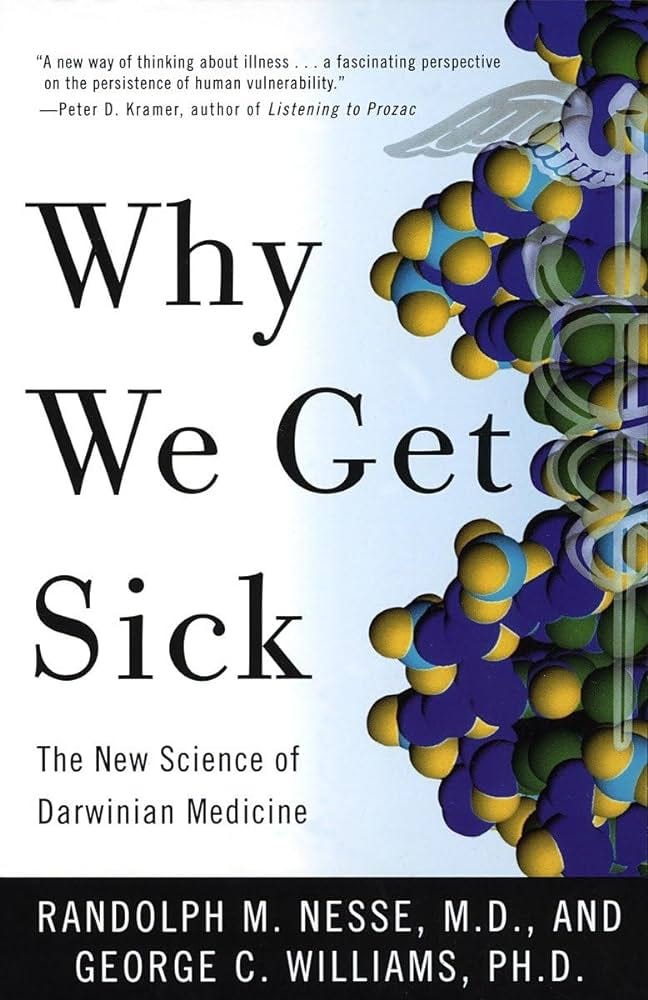Hi Eimear, it’s lovely to have you on the Substack so thank you for doing this, I wonder if we can begin by you telling us how you got interested in Psychiatry and where you’re working currently?
My interest in Psychiatry undoubtedly began with my mother, who is also a consultant psychiatrist. I was always impressed by how much she enjoyed her work and all of the interesting stories that she had when I was growing up. In college and my early post-grad years, I was a little unsure. I loved studying psychiatry but the practice was a little different than I had expected. I was afraid that by becoming a psychiatrist I’d be leaving medicine behind so I completed a basic medical scheme before commencing psychiatry and this helped to satisfy my medical yearnings.
I am currently employed as a General Adult psychiatrist in the Sligo Leitrim Mental Health Service. My area is quite rural but with a busy urban area in Donegal so I see a very interesting mix of patients. It’s a great place to work.
Is there a moment that you’ve been particularly proud of in your professional life?
That is a tricky one and not something I’ve given much thought to before. I took quite a circuitous route through training and became a GP in the middle of it all so I think that probably realising my long term ambition and finally qualifying as a consultant psychiatrist and was quite a proud moment.
Any particular stories/situations that have led you down your current path?
I think that my mid-psychiatry training decision to train as a GP had an enormous and unintended influence on my current path. When I returned to complete psychiatry training my perspective was completely changed. I was of course more experienced in general and working as a GP really helped me to understand the whole of the patient in terms of their biopsychosocial context. I had gained a really good understanding of the importance of non-biological factors in patient’s illnesses. I also had much more informed opinions on the issues relating to medical management of patients with mental illness. I was really quite shocked when I realised that many of our patients were really in poor shape physically and were not receiving any proper treatment for their illnesses. I also understood the challenges that GPs would face in trying to deliver this care. This led me to complete some research in this area which led to the setting up of the Physical Illness in Mental Ilness Special Interest Group (PILSIG) as part of the College of Psychiatrists of Ireland. Since then I have become involved in several side groups and all kinds of interesting projects aimed at improving physical outcomes for patients with mental illness.

I was really quite shocked when I realised that many of our patients were really in poor shape physically and were not receiving any proper treatment for their illnesses.
Yes the mortality gap and acheiving parity of esteem are indeed challenges that need addressing so congratulations on establishing your special interest group! Can you take us through how this came about and the need for it?
I set up the PILSIG as through my research which looked at the role of leadership in improving physical health outcomes for patients with mental illness, it became clear that while much research was being done, there was no clear immediate or internationally accepted plan to address this.
Many initiatives were happening independently of each other by different professional groups yet there did not seem to be active collaboration between the main stakeholders. Even in more robust policy documents I could see that there were notable absences, most often a lack of consideration of the patients’ views and challenges. Also, I could see that a lot of work was happening in General Practice and in wider medical circles and I was concerned that the voice of the psychiatric patient and their clinicians was being neither sought nor heard. Given my cross training I felt that I was well placed to start a SIG and I felt that this needed to happen immediately so that we could inform ourselves and raise our profile as psychiatrists and medical doctors who are committed to improving all aspects of our patients health and not just their psychological wellbeing, important as that obviously is.
Absolutely, there is a large aspect of physical health which is neglected in mental health, what can we be doing better?
In terms of doing things better for our psychiatric patients, I think that we need to adopt a whole systems approach. Firstly, we need to clarify what needs to be done and secondly, agree who should do this.
There are interesting models being proffered by GPs in terms of funding severe mental illness as a chronic disease and I think that there is merit in this. However, there is data to show that even when this is provided, patients with SMIs still struggle to attend GP services due to various internal and external barriers. We also know that patients with mental illness don’t tend to take up screening services as much as others putting them at risk of more advanced disease at diagnosis.
Similarly, patients with SMIs tend not to go to secondary OPD services. A really simple thing that we can all do is to ask our patients when we see them when the last time they visited their GP was and encouraging them to do so if not done within the last year. There are several chronic disease management schemes already operating in primary care and a large proportion of our patients would meet the criteria for enrolment in these. Encouraging our patients to attend GPs might also help to normalise this for them as stigma is a huge barrier for patients in attending mental health services. They also need to attend OPD appointments and may have practical reasons why they don’t attend. Discussing this and problem solving in terms of arranging lifts etc through family members can help to overcome this. In the longer term, we need to clarify and strengthen pathways between psychiatry, primary care, and secondary care to better advocate for our patients and to monitor and understand their needs.
A really simple thing that we can all do is to ask our patients when we see them when the last time they visited their GP was and encouraging them to do so if not done within the last year.
How did you become interested in Evolutionary Psychiatry and do you see any useful overlaps between your work and evolutionary principles?
I first became aware of evolutionary psychiatry when I read “Why we get sick” by Ranolph Nesse as part of the first thinktank bookclub. I was blown away by finding quite literally what I considered to be “the missing link”. This interest was piqued further when I joined the Evolution and Psychiatry Special Interest Group (EPSIG) chaired by Prof Henry O’Connell which opened my eyes to a whole world of thinking that had been previously hidden from me. Since then I have come across an abundance of crossovers between evolutionary principles and physical illness in mental illness.
An obvious example is obesity which unfortunately affects patients with mental illness more than those without and is promoted by evolutionary mismatch between our obesogenic environments and our evolutionary adaptedness. The world of evolutionary psychoneuroimmunology and how it can be applied to mental illness is another fascinating area which will hopefully improve our understanding and provide novel treatments.
What would your opinion of the current paradigm of psychiatry be?
While all aspects of the current biopsychosocial paradigm of mental illness are worthy of consideration when diagnosing and treating mental illness, I personally believe that, as medical doctors, we should focus more than we currently do on neuropsychiatry and neuropsychology for both diagnosis and tailoring of our treatments to individuals.
At an undergraduate level, there is a heavy focus on the psychosocial aspects of our management which often do not accurately reflect the role of the psychiatrist. When I worked as a clinical tutor, I found that medical students found this off putting and it often discouraged them from considering psychiatry as a career. Emphasising the medical science aspect and linking this with less concrete psychological constructs could help students to understand what the role of the psychiatrist as a medical doctor is. I think that this is where evolutionary psychiatry concepts shine.
Looking at psychiatric illness from the evolutionary perspective allows for the application of a scientific framework to conceptualise how our brains evolved (biological) in response to the survival challenges that we faced (psychological) as we evolved as humans. In other words, it acknowledges that experiential learning impacted on our basic neuropsychological responses (some of which could be viewed today as maladaptive), and why these traits were then maintained and perpetuated through potential survival benefits that they may have afforded. So in answer to the question, I think that any new paradigm should continue to be rooted in an inclusive biopsychosocial model but should incorporate and highlight evolutionary, neuroscience, and neuropsychological principles and how these interplay to explain modern day psychiatric illness.
Looking at psychiatric illness from the evolutionary perspective allows for the application of a scientific framework to conceptualise how our brains evolved (biological) in response to the survival challenges that we faced (psychological) as we evolved as humans.
What would your ideal paradigm be if resources were not an issue?
If resources were not an issue, I would have a fully staffed MDT and not be dependent on doctors and nurses to provide all interventions! Ultimately, I would like to see psychiatry viewed as part of “the continent of medicine” and treated as such rather than being confined to our own St. Helena. This would require a significant shift in how we think about psychiatry and also how we teach it to both undergraduates and post-graduates. It would also require that, as psychiatrists, we become much more involved in the overall medical structure which does not appeal to everyone but I think that it’s vital if we are to advocate for our patients appropriately. Of course, in an ideal world there would be immediate access to evidence based investigations and neuroimaging to build a biological catalogue of psychiatric illness which could then be utilised to scientifically test interventions beyond medicines - but I’d settle for a team social worker!

What are you working on currently? And what’s instore for you in the near future?
I am involved in many interesting projects at the moment. The physical illness in mental illness SIG continues to grow and we are hoping to complete a new monitoring form for use nationally to monitor the physical health of patients with mental illness in the community. We have had presentations (and have more planned) from medical consultants, endocrinologists and cardiologists amongst others, and already this has led to collaborative projects between psychiatry and secondary medical services which are exciting. I am involved in a group that is trying to improve shared care between psychiatry and GPs with the aim of improving physical health outcomes for patients, and another group made up of various allied health professionals to share ideas and information to see if we can implement changes at a faster pace on the ground. I am very much looking forward to a collaboration between the physical illness SIG and the evolutionary SIG in the New Year! The details of this are undecided as yet and I am excited about the possibilities that may emerge.
Wow you have been incredibly productive! It’s wonderful to hear such important work and collaboration occuring already. Thank you so much for taking the time to speak with me today Eimear. Do you have any further links/reading for people would like to learn more?
Thank you for having me it was a pleasure, please see link below:
The Physical Illness in Mental Illness Special Interest Group (College of Psychiatrists of Ireland)
If you enjoyed this article and would like to discover more about Evolutionary Psychiatry please consider:
subscribing to our Substack to receive regular content updates
visiting the webpage of the Evolution and Psychiatry Special Interest Group within the College of Psychiatrists of Ireland
visiting the webpage of the Evolutionary Psychiatry Special Interest Group within the Royal College of Psychiatrists
exploring a Youtube playlist on curated presentations by the Evolution and Psychiatry Special Interest Group within the College of Psychiatrists of Ireland
exploring the Youtube page of the Evolutionary Psychiatry Special Interest Group within the Royal College of Psychiatrists
exploring the Evolving Psychiatry podcast










